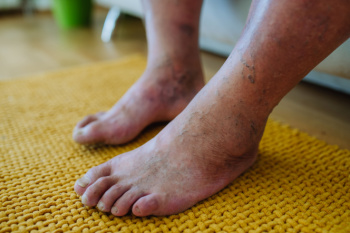
Foot pain is a common issue for diabetics, often caused by nerve damage or neuropathy, or poor circulation. Patients may experience a range of sensations, from a dull, aching pain to sharp, burning, or tingling feelings in the feet. Diabetic foot pain may be constant or worsen when walking or standing for long periods. As the nerves in the feet are affected, individuals may also experience numbness, making it harder to feel injuries or infections. The causes of diabetic foot pain include high blood sugar levels that damage nerves and blood vessels, as well as poor circulation, which slows down healing. Symptoms include pain, numbness, tingling, and increased sensitivity to touch or pressure. A podiatrist can help by thoroughly examining the feet to assess nerve function and circulation. Treatment options may include custom footwear, orthotics, medications, or targeted exercises to improve circulation. A podiatrist can also monitor the feet for any signs of infections or ulcers. If you have diabetic foot pain, it is suggested that you schedule an appointment with a podiatrist for a tailored treatment and management plan.
Diabetic foot care is important in preventing foot ailments such as ulcers. If you are suffering from diabetes or have any other concerns about your feet, contact Franklin Harry, DPM from Best Foot Forward. Our doctor can provide the care you need to keep you pain-free and on your feet.
Diabetic Foot Care
Diabetes affects millions of people every year. The condition can damage blood vessels in many parts of the body, especially the feet. Because of this, taking care of your feet is essential if you have diabetes, and having a podiatrist help monitor your foot health is highly recommended.
The Importance of Caring for Your Feet
- Routinely inspect your feet for bruises or sores.
- Wear socks that fit your feet comfortably.
- Wear comfortable shoes that provide adequate support.
Patients with diabetes should have their doctor monitor their blood levels, as blood sugar levels play such a huge role in diabetic care. Monitoring these levels on a regular basis is highly advised.
It is always best to inform your healthcare professional of any concerns you may have regarding your feet, especially for diabetic patients. Early treatment and routine foot examinations are keys to maintaining proper health, especially because severe complications can arise if proper treatment is not applied.
If you have any questions please feel free to contact our offices located in Festus and St. Louis, MO . We offer the newest diagnostic and treatment technologies for all your foot and ankle needs.

An ankle sprain occurs when the ligaments that support the joint are stretched or torn due to excessive force. The most common type is an inversion sprain, where the foot rolls inward, causing damage to the outer ligaments. An eversion sprain is less common and happens when the foot rolls outward, affecting the inner ligaments. The severity of ankle sprains is classified into grades. A mild sprain involves slight stretching of the ligaments with minimal swelling. A moderate sprain includes partial tearing, increased swelling, and difficulty bearing weight. A severe sprain results in a complete ligament tear, significant swelling, and joint instability. Strengthening exercises, balance training, and supportive footwear can help prevent future injuries and maintain ankle stability. If you have sprained your ankle, it is suggested that you contact a podiatrist who can offer treatment solutions based on the type and severity of the sprain.
Ankle sprains are common but need immediate attention. If you need your feet checked, contact Franklin Harry, DPM from Best Foot Forward. Our doctor can provide the care you need to keep you pain-free and on your feet.
How Does an Ankle Sprain Occur?
Ankle sprains take place when the ligaments in your ankle are torn or stretched beyond their limits. There are multiple ways that the ankle can become injured, including twisting or rolling over onto your ankle, putting undue stress on it, or causing trauma to the ankle itself.
What Are the Symptoms?
- Mild to moderate bruising
- Limited mobility
- Swelling
- Discoloration of the skin (depending on severity)
Preventing a Sprain
- Wearing appropriate shoes for the occasion
- Stretching before exercises and sports
- Knowing your limits
Treatment of a Sprain
Treatment of a sprain depends on the severity. Many times, people are told to rest and remain off their feet completely, while others are given an air cast. If the sprain is very severe, surgery may be required.
If you have suffered an ankle sprain previously, you may want to consider additional support such as a brace and regular exercises to strengthen the ankle.
If you have any questions please feel free to contact our offices located in Festus and St. Louis, MO . We offer the newest diagnostic and treatment technologies for all your foot and ankle needs.

Pickleball places significant demands on the feet, toes, and ankles due to frequent lateral movements, rapid direction changes, and sudden stops. Proper footwear for pickleball is essential to enhance stability during play and reduce the risk of injury. Unlike running shoes, which are designed for forward motion, pickleball shoes provide more lateral support, a reinforced heel counter, and a midfoot shank to help stabilize the foot. A thicker midsole affects comfort and mobility with cushioning that provides more shock absorption, while a thinner midsole allows for quicker movements. The outsole material is another key factor in choosing pickleball shoes. Outdoor pickleball shoes require durable rubber for traction on hard courts, while indoor shoes use softer rubber for better grip on wood or laminate surfaces. Choosing the correct shoe width and length is important to avoid foot strain or discomfort. A podiatrist can assess your foot mechanics, recommend appropriate footwear, and address any pain or discomfort that arises from playing pickleball. If you experience foot pain from playing pickleball, it is suggested that you schedule an appointment with a podiatrist.
Ankle and foot injuries are common among athletes and in many sports. They can be caused by several problems and may be potentially serious. If you are feeling pain or think you were injured in a sporting event or when exercising, consult with Franklin Harry, DPM from Best Foot Forward. Our doctor will assess your condition and provide you with quality foot and ankle treatment.
Common Injuries
The most common injuries that occur in sporting activities include:
- Achilles Tendonitis
- Achilles Tendon Rupture
- Ankle Sprains
- Broken Foot
- Plantar Fasciitis
- Stress Fractures
- Turf Toe
Symptoms
Symptoms vary depending upon the injury and in some cases, there may be no symptoms at all. However, in most cases, some form of symptom is experienced. Pain, aching, burning, bruising, tenderness, tightness or stiffness, sensation loss, difficulty moving, and swelling are the most common symptoms.
Treatment
Just as symptoms vary depending upon the injury, so do treatment options. A common treatment method is known as the RICE method. This method involves rest, applying ice, compression and elevating the afflicted foot or ankle. If the injury appears to be more serious, surgery might be required, such as arthroscopic or reconstructive surgery. Lastly, rehabilitation or therapy might be needed to gain full functionality in the afflicted area. Any discomfort experienced by an athlete must be evaluated by a licensed, reputable medical professional.
If you have any questions, please feel free to contact our offices located in Festus and St. Louis, MO . We offer the newest diagnostic and treatment technologies for all your foot care needs.

